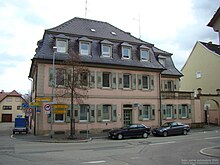Konrad Erckenbrecht
Konrad Erckenbrecht (born January 5, 1751 in Heidelberg ; † December 29, 1820 in Mannheim ) was mayor in Eppingen from 1778 to 1798 . He was deposed in 1798 and died in the Mannheim penal institution for fraud such as the production of false bonds, which had damaged many citizens and the Eppingen city treasury.
Life
Erckenbrecht's father Johann (born November 2, 1702; † October 18, 1757) was secretary and registrar at the church council in Heidelberg; his mother Susanne Catharina, nee Guggenmus, was the sister of the previous Eppinger mayor Lorenz Guggenmus (in office from 1750 to 1777). The family was well off and had been associated with the Reformed faith for generations. Erckenbrecht studied law at the University of Heidelberg (matriculated on May 23, 1770); he was married to Anna Dyckerhoff.
In favor of the city, Erckenbrecht obtained the confirmation of Eppinger's city privileges from the Palatinate Elector on October 10, 1781, including the exemption from military service of the Eppinger citizens and their sons, which the city could successfully refer to in 1795. Because of Erckenbrecht's merits in the creation of a "highway, to housekeeping and police" of Eppingen, the elector issued an order on October 25, 1781, Erckenbrecht's annual salary from February 1, 1782 to 100 guilders, 20 Malter spelled and 25 Malter oats To increase the city's funds.
Erckenbrecht's recognition and prosperity were expressed in the construction of his large house in the Bretten suburb. The stately house was completed between 1781 and 1784. After the fall of the builder in 1814, it went to the city of Eppingen, which made it available to the newly created Eppingen District Office as the official seat. The building of the house at Brettener Straße 57 was praised by the government as part of an exemplary urban expansion. Erckenbrecht was also committed to the construction of a road and granted a city loan for this purpose. In recognition of his services, he was awarded the title of Hofkammerrat .
Erckenbrecht's case began in 1797. He was the administrator of an inherited estate in the Electoral Palatinate ( Fehsenbeckisches Gütlein ), which belonged to Johann Horsch, who lived in Rossach near Adelsheim. In his name, the mayor led a lengthy process against the government without the owner having authorized him to do so. Erckenbrecht had not only falsified a power of attorney to conduct the litigation, but also took advantage of the owner of this property. In the course of the legal dispute over the Fehsenbeckische Gütlein , Johann Horsch was appointed to the government, and everything was revealed on November 10, 1797. When the mayor was to be questioned, he fled. After escaping and arrest, Erckenbrecht was taken to the Mannheim penitentiary and accused of producing false bonds. He had brought many citizens and the city treasury of Eppingen into debt through his fraud and brought them close to financial ruin. Subsequently, with the approval of the elector on March 14, 1798, further officials such as the council servant Vistula, the Zollbereuter Beiswenger and the market master Appiarius were deposed. Erckenbrecht died in the Mannheim penal institution in 1820.
literature
- Franz Gehrig : The offices of the city of Eppingen and their owners . In: Around the Ottilienberg. Contributions to the history of the city of Eppingen and the surrounding area , Volume 2. Heimatfreunde Eppingen , Eppingen 1982, pp. 24–40.
- Marieluise Erckenbrecht: The Erckenbrecht of Sinsheim. From the story of a farming family in Kraichgau . In: Kraichgau. Contributions to landscape and local research , volume 10, 1987, pp. 148–158.
- Walter Vesenbeckh: The Fesenbeck, an old Kraichgau family . In: Kraichgau. Contributions to landscape and local research , volume 14, 1995, pp. 265–280.
Individual evidence
- ↑ Edmund Kiehnle: Eppingen from 1803-1933 . In: Around the Ottilienberg , Volume 2. Heimatfreunde Eppingen, Eppingen 1982, p. 206.
| personal data | |
|---|---|
| SURNAME | Erckenbrecht, Konrad |
| BRIEF DESCRIPTION | Mayor in Eppingen |
| DATE OF BIRTH | January 5, 1751 |
| PLACE OF BIRTH | Heidelberg |
| DATE OF DEATH | December 29, 1820 |
| Place of death | Mannheim |
